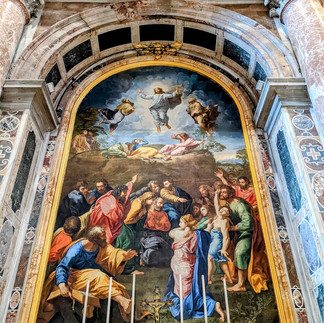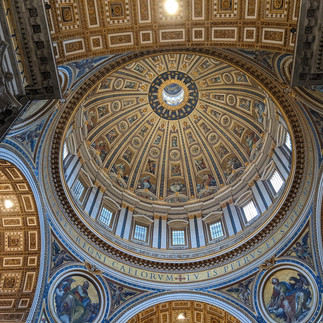When in Rome...
- Mar 24, 2022
- 4 min read
After our first St. Patrick’s Day in Ireland, which we celebrated in style with face-painting, a trip to the parade (packed, difficult to see anything but great crowd energy), Irish coffee and scones at Bewley’s, and dinner at our local, we headed off to Rome for the long weekend. A couple of months ago Sally asked me, “Mommy, what’s your favorite ancient civilization? Mine’s Rome.” So, to Rome we went.
On Saturday morning we started strong by picking up a pastry for Sally and Americano coffee for me to enjoy during our walk to the Colosseum. Around every corner we were delighted by the gorgeous old buildings and statues. It was early by big city standards so the city was relatively quiet as we made our way through the ancient district.
The area around the Colosseum was bustling, though, with everyone and his brother (not being sexist, they’re all men) trying to sell you tickets to something or give you directions you didn’t need. We navigated through and entered. Unfortunately the line for the audioguide or tours was insanely long, so we just used good old Rick Steves’ guidebook for our tour. It did make me feel the need to rewatch the movie, Gladiator. I was fascinated to learn that the word “vomit” came from here…a vomitorium is actually a passage or opening in a theatre (or amphitheatre) that leads to or from the seating, through which the audience members would pass. So when the games would end, the Colosseum would vomit out its fans.
From there we headed over to Saint Peter’s (plus a quick walk-by of the Pantheon, which we skipped because the line was nuts) and Vatican City.

We had a guided tour of St. Peter’s. I did not realize that many of the deceased popes were mummified in glass (visually open) coffins around the main floor of the church. In most cases it sounded like this unintentional mummification was considered a miracle so the pope in question was canonized. Mostly I was overwhelmed by the size of the church and the gold-plated splendor it displays. Our tour guide was wonderful and spoke almost perfect English. However, she was describing the 15th century war with Turkey and she kept using the term “turkeys” instead of “Turks” or “the Turkish”…so it went something like this…”…and then the Italians had to fight the turkeys…it was a tough battle against the turkeys but they were able to defeat the turkeys.” It was difficult to act mature and respectful.
That evening as Sally and David had some much-needed down time in the hotel, I walked over to Piazza del Popolo and explored the park around Borghese/Piazza del Pincio. It was a beautiful evening and love was in the air. The park was absolutely filled with teenagers mightily making out (all sitting the same way on the benches, it was like a weird movie set), or zipping around on scooters or bikes, or families or pods of teens in those weird little four-person bike cars.
For dinner we head to Old Bear, but unfortunately we never learned the origin of the name.
In spite of the odd name, it was very charming (indoors and out!) and delicious.
On Sunday we spent the morning roaming the ruins at the Forum, a huge excavated area of the 2000-year-old Roman city including temples, government buildings, etc. We again relied on Rick Steves’ tour from the book, which was just about the right level of information for us.
Highlights - Caligula’s palace overlooking the Vestel Virgins’ home (he was a real creep, would have totally fit into current American politics), and Caesar’s grave (still gets flowers on it! - but just looks like a lump of dirt). Amazing that at the height of the Roman empire some 1 million people lived there, more than any other city for another almost 2000 years. But when Rome fell the population dropped to about just 10,000 people and the old city got slowed covered over until about the early 19th century.
We also walked through the glorious Piazza Navona, saw a couple get engaged Trevi Fountain before we threw in our 5-cent pieces, and checked out the Spanish Steps. I was trying to remember why the Spanish steps were so famous, because they were rather underwhelming. I looked it up and read that “The Spanish steps represent figuratively and metaphorically the close relationship between the Sacred and the Eternal city, shown through the elevation and vastness of the monument. The longest and widest steps in Europe are also an important landmark in Rome as they host events and are home to Italian traditions.” However, there are so many other longer staircases, even just around the corner in Rome. Perhaps at one time they were the grandest, then they got overrun by tourists and dwarfed by other staircases in the age of bigger is better.
In the late afternoon we checked out the Borghese gallery, which was quite lavish and had really spectacular ceilings (I was less enamored with the art itself). On this one I think Rick Steves was incorrect in saying it was a “must-see,” though I did enjoy the park surrounding it.
Two days in Rome was just about the perfect amount of time. Rome was the truest example we’ve seen thus far of the world being back open for business "after" COVID. It was absolutely packed with tourists (though nothing, I’m sure, compared to what it would be like over spring break or in the height of summer). Yet because Italy was hit so hard during the pandemic, the mask laws and vaccine requirements are still very much in effect. They just don’t want to chance it again.

It’s such an interesting city because there is some gorgeous [literally] ancient details everywhere you look, yet it’s also disturbingly filthy. Every surface looks (and smells) like it’s recently been micturated upon and there’s trash strewn on most surfaces. The city is also littered with scooters and bikes that people pay to rent and then can leave wherever they want (and, by god, they do—covering sidewalks and streets, it’s highly inconvenient). These aspects make me sad for this icon of the birth of modern civilization, though perhaps it’s telling. I’m so glad we went, we had an awesome time, and it’ll be okay if it’s another 20-some years before I return. We came, we saw, we conquered. When in Rome…












































































































Comments